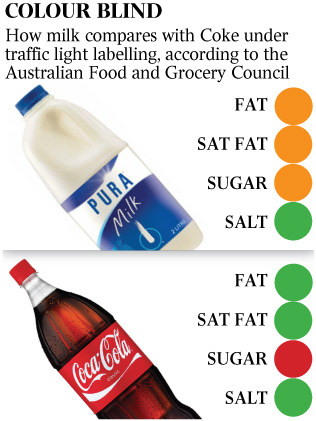
Is it time for better labeling on our food? – Image from the Australian
Recently a coroner’s report fingered excessive consumption of Coca Cola in the death of an Invercargill woman. She apparently drank 10 litres per day – the coroner estimated that this was 2 times the recommended maximum daily amount of caffeine, and more than 11 times the recommended maximum sugar intake. Of course the lobby groups of the soft drink peddlers are disputing whether Coke can be blamed, and rolling out the usual message that nutrition is up to the individual and we have to look at people’s diet as a whole.
So was she an addict as the coroner found or an idiot as Coke are implying? A good chunk of Kiwis would probably agree with Coke – most people see diet as being an issue of purely personal responsibility. Surely she knew what she was doing – drinking herself to death – as surely as we know it when smoking and taking heroin.
[quote align=”right” color=”#999999″]brain scans have found that people can be just as addicted to sugar, salt and fat as we can be to alcohol, cigarettes and drugs[/quote] But the bulk evidence coming to light over recent years suggests that the public have been blindly towing the industry line. We are willing conspirators in their charade. The surprising thing is that we Kiwis actually know very little about the impact from what we eat on our health. In fact, less than half of us really know enough to take care of ourselves. And no wonder, most schools don’t teach about food and we have lost sight of the common sense handed down from our grandmothers.Meanwhile the food industry has been allowed to proliferate new imitation foods, and convince us that they all have a place as part of a normal ‘balanced’ diet. What a load of codswallop. Refined sugar had virtually no part in our diet up until the last century, and now for people like Natasha Harris (the aforementioned deceased from Invercargill) it makes up the majority of their energy intake.
The coroner is calling for warning labels for soft drinks, particularly those that contain caffeine. However, it is even more likely that it was the sugar in Coke that caused Natasha’s untimely demise. Sugary diets are being linked with heart disease, and may end up as an even worse threat to our health than the incumbent pariah, saturated fat.
To make matters worse, brain scans have found that people can be just as addicted to sugar, salt and fat as we can be to alcohol, cigarettes and drugs. These latter three are all controlled substances, yet we allow sugar salt and fat peddlers to bombard our kids with advertising and stores selling these goods right outside their school gates.
There is certainly a need for better food and drink labelling as the coroner suggests, but it needs to go far wider than he is recommending. We need a simple nutrition label that informs people about the health impacts of what they are eating. There are plenty of options around, we just need to work out what the public finds the easiest to use. The Government has been reviewing this issue for some time, but has already shot itself in the foot by announcing that any scheme will be voluntary. Why would Coke voluntarily put a label on its bottle telling people that it contains nothing of nutritional value and could contribute to your untimely demise? It would never do that.
Later this year I will be releasing a book on Food and the health issues that it is causing New Zealand as a nation. You can find out more about the food book and register for to get a free chapter here.

